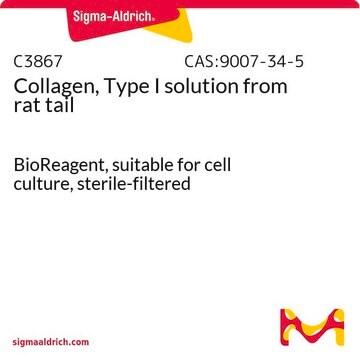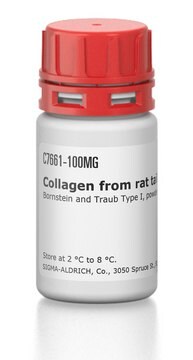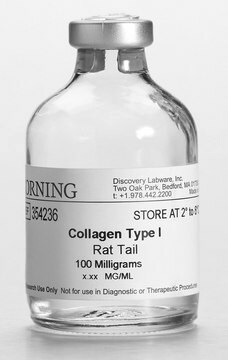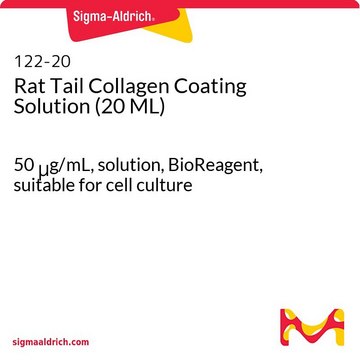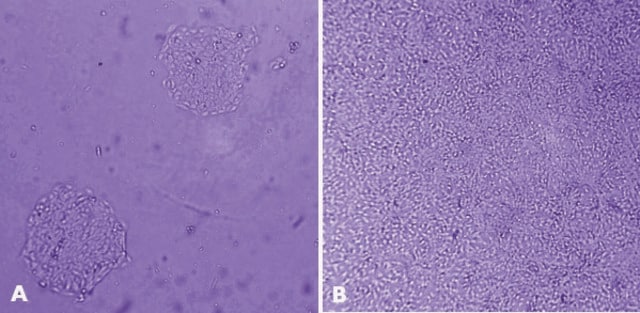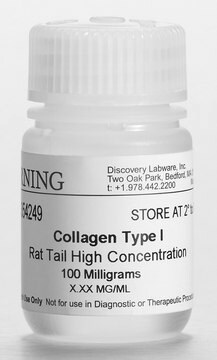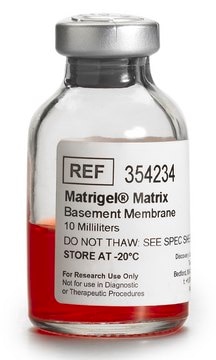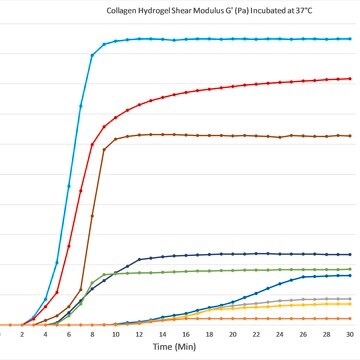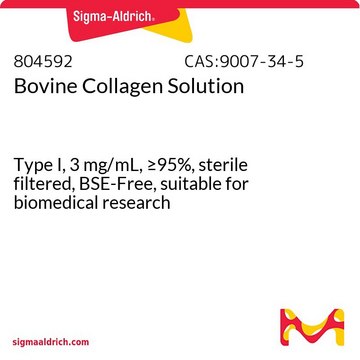3447-020-01
Cultrex 3-D Culture Matrix™ Rat Collagen I
Zaloguj sięWyświetlanie cen organizacyjnych i kontraktowych
About This Item
Kod UNSPSC:
12352200
Polecane produkty
pochodzenie biologiczne
rat
sterylność
sterile
masa cząsteczkowa
300 kDa
stężenie
5 mg/mL
metody
cell culture | mammalian: suitable
rozpuszczalność
water: miscible
Warunki transportu
ambient
temp. przechowywania
2-8°C
Opis ogólny
The 3-D Culture Matrix™ Rat Collagen I may be used as a gel on which to grow cells or a medium additive, alone or in concert with other basement membrane components, to study cellular growth and differentiation in three dimensions in vitro. Type I Collagen is the major structural component of extracellular matrices found in connective tissue and internal organs, but is most prevalent in the dermis, tendons, and bone. It is a 300 kDa molecule composed of two alpha1(I) chains and one alpha2(I) chain that spontaneously forms a triple helix scaffold. This phenomenon can be exploited to promote cell attachment, growth, differentiation, migration, and tissue morphogenesis during development. The 5 mg/ml concentration is very viscous for researchers wanting a thicker Collagen.
Postać fizyczna
Solution in 20 mM Acetic Acid, pH 3.4 - 3.6
Inne uwagi
Functional Assay: 3-D Culture: Collagen I forms a gel when diluted to 0.4 mg/ml at neutral pH and promotes attachment and growth of murine endothelial SVEC4-10 cells. Cell Attachment: Tested for the ability to promote cell attachment and spreading of HT1080 human fibrosarcoma cells.
Sterility Testing: No bacterial or fungal growth detected after incubation at 37°C for 14 days following USP XXIV Chapter 71 sterility test. No mycoplasma contamination detected by PCR.Endotoxin concentrations = 20 EU/ml by LAL assay.
Storage Conditions and product stability: Product is stable for a minimum of 3 months from date of shipment if stored at 4°C. Do Not Freeze.
Informacje prawne
3-D Culture Matrix is a trademark of Trevigen, Inc.
Ta strona może zawierać tekst przetłumaczony maszynowo.
Kod klasy składowania
10 - Combustible liquids
Klasa zagrożenia wodnego (WGK)
WGK 2
Temperatura zapłonu (°F)
Not applicable
Temperatura zapłonu (°C)
Not applicable
Wybierz jedną z najnowszych wersji:
Certyfikaty analizy (CoA)
Lot/Batch Number
It looks like we've run into a problem, but you can still download Certificates of Analysis from our Dokumenty section.
Proszę o kontakt, jeśli potrzebna jest pomoc Obsługa Klienta
Masz już ten produkt?
Dokumenty związane z niedawno zakupionymi produktami zostały zamieszczone w Bibliotece dokumentów.
Klienci oglądali również te produkty
Claudia Beaurivage et al.
Scientific reports, 10(1), 21475-21475 (2020-12-10)
Inflammatory bowel disease (IBD) is a complex multi-factorial disease for which physiologically relevant in vitro models are lacking. Existing models are often a compromise between biological relevance and scalability. Here, we integrated intestinal epithelial cells (IEC) derived from human intestinal
Nasz zespół naukowców ma doświadczenie we wszystkich obszarach badań, w tym w naukach przyrodniczych, materiałoznawstwie, syntezie chemicznej, chromatografii, analityce i wielu innych dziedzinach.
Skontaktuj się z zespołem ds. pomocy technicznej
